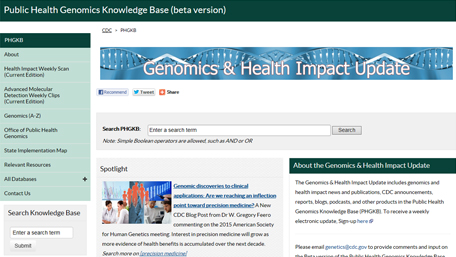Category: genomics
Newborn screening for severe combined immune deficiency (SCID) saves lives and money: a cost-effective public health policy

Severe combined immune deficiency (SCID), also known as “bubble boy disease,” is a rare inherited disorder of the immune system that leads to recurrent severe infections. In the absence of effective treatment, SCID is usually fatal within the first 2 years of life. Treatment by hematopoietic cell transplantation can minimize the devastating effects of SCID, Read More >
Posted on byCancer Precision Medicine: More Population Sciences Ahead!

We explore briefly the expanding role of population sciences in the implementation of the NIH Precision Medicine Initiative (PMI). The initiative includes a major component on cancer precision treatment, and a large scale cohort study program to generate knowledge applicable to all areas of health and disease, including cancer risk factors and outcomes. Genomics is Read More >
Posted on byPrecision Medicine: the Arrival of Genomics to the Clinic is the Beginning of a Longer Journey

It has been a year since the announcement of the new US Precision Medicine Initiative. As new funding is awarded to investigators across the country, the pace of assembling the cohort of a million or more individuals will accelerate. This cohort will link information from genomic, behavioral, social, environmental, and health outcomes to discover and Read More >
Posted on byNational Family History Day 2015: Thinking globally and acting locally

Though you probably will not find greeting cards in stores celebrating this fact, Thanksgiving has been known as National Family History Day in the U.S. since 2004. The Office of the U.S. Surgeon General and many federal, state and private partners have marked each year with events and announcements promoting the collection and use of family Read More >
Posted on byDealing with the Genomics and Health Information Overload: Introducing the CDC Public Health Genomics Knowledge Base

Understanding genetic information is increasingly becoming important for health decision making for a variety of health conditions across the lifespan. The amount of genome-related information is growing exponentially, but it is scattered all over the web, peer-reviewed literature, and public and private databases. The CDC Office of Public Health Genomics has launched the beta version Read More >
Posted on byGenomic discoveries to clinical applications: Are we reaching an inflection point toward precision medicine?

Each year at the annual American Society of Human Genetics (ASHG) meeting I follow certain rituals. During the first “poster session”, I quickly peruse all of the vendor booths on the floor to assess something of the overall flavor of the commercial space’s focus. During the next two poster sessions I cruise all of the Read More >
Posted on byPrecision Medicine and Public Health: Improving Health Now While Generating New Knowledge for the Future

In a previous post, I commented on the importance of a public health perspective to ensure the success of the proposed precision medicine large national research cohort. Here I offer additional thoughts on the need to balance short term public health gains with long term knowledge generation from this effort. Read More >
Posted on byThe Ultimate Selfie

Now within reach, our personal genomic sequence offers an incredible reflection of who we are, and great promise to improve human health, but there are serious concerns about embracing it too quickly. Empowered Consumers in the Era of Me If social media is any indication, we, like Narcissus of ancient myth, are surely self-obsessed creatures. Read More >
Posted on by 3 CommentsUsing Genomics in Precision Prevention of Breast Cancer

Breast cancer is the most common cancer in women in the United States. It is estimated that 3%-5% of breast cancer cases are hereditary, most often involving mutations in BRCA1 and BRCA2 genes. Such mutations confer high lifetime risk of breast and ovarian cancer. The United States Preventive Services Task Force has issued specific recommendations Read More >
Posted on byWhen a Country Cannot be a Cohort: Challenges of Implementing a Large Precision Medicine Cohort Study in the United States

The recently proposed US precision medicine initiative promises a new era of healthcare with targeted disease treatment and prevention. It prominently features a longitudinal study of a national cohort of a million or more people to customize interventions based on a person’s genetics and other factors. The long term goal of this study is to Read More >
Posted on by

